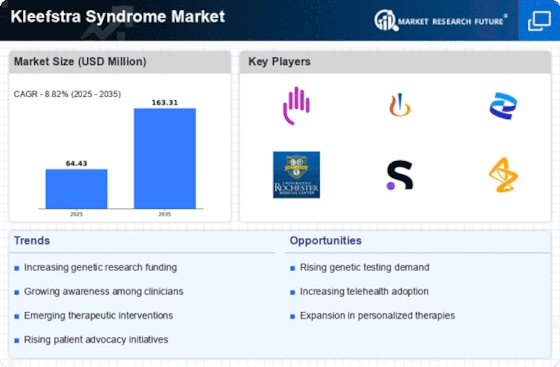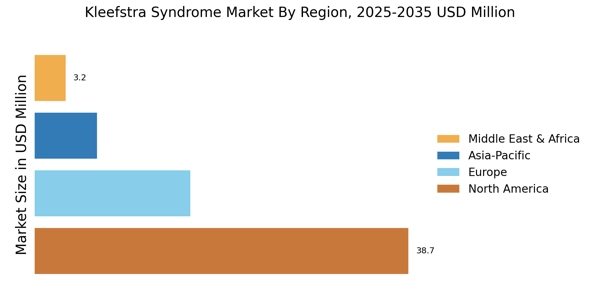Emerging Therapeutic Options
The emergence of new therapeutic options is a pivotal driver in the Kleefstra Syndrome Market. Recent advancements in pharmacological treatments and gene therapy are showing promise in managing the symptoms associated with Kleefstra Syndrome Market. Clinical trials are underway, exploring various compounds that target the underlying genetic causes of the disorder. The potential approval of these therapies could significantly alter the treatment landscape, providing patients with more effective management strategies. Market analysts project that the introduction of innovative therapies may lead to a substantial increase in market size, with estimates suggesting a growth rate of around 15% over the next five years. This evolving therapeutic landscape indicates a bright future for the Kleefstra Syndrome Market, as new options become available to improve patient outcomes.
Enhanced Diagnostic Techniques
Advancements in diagnostic techniques are significantly influencing the Kleefstra Syndrome Market. The development of next-generation sequencing and other genetic testing methods has made it easier to identify Kleefstra Syndrome Market at an earlier stage. This early diagnosis is crucial, as it allows for timely intervention and management of symptoms. The market for genetic testing is projected to grow, with estimates indicating a compound annual growth rate of over 10% in the coming years. As healthcare providers increasingly adopt these advanced diagnostic tools, the demand for related services and products in the Kleefstra Syndrome Market is expected to rise. This trend not only facilitates better patient management but also encourages further research into the genetic underpinnings of the syndrome, potentially leading to novel therapeutic approaches.
Increased Focus on Patient-Centric Care
The shift towards patient-centric care is reshaping the Kleefstra Syndrome Market. Healthcare providers are increasingly prioritizing the needs and preferences of patients and their families. This approach encourages the development of tailored treatment plans that consider individual patient circumstances, which is particularly relevant for rare conditions like Kleefstra Syndrome Market. The emphasis on patient engagement and shared decision-making is likely to drive demand for services that support this model of care. Additionally, as patients become more informed about their conditions, they may seek out specialized care options, further influencing the market dynamics. This trend suggests that the Kleefstra Syndrome Market will continue to evolve, with a focus on improving patient experiences and outcomes.
Rising Prevalence of Kleefstra Syndrome
The increasing prevalence of Kleefstra Syndrome Market is a notable driver in the Kleefstra Syndrome Market. Recent estimates suggest that the incidence of this genetic disorder is approximately 1 in 20,000 live births. This rising prevalence is likely to lead to a greater demand for diagnostic and therapeutic options, thereby expanding the market. As awareness grows among healthcare professionals and families, the need for specialized care and support services is becoming more pronounced. This trend indicates a potential increase in funding for research and development, which could further enhance treatment options available in the Kleefstra Syndrome Market. Consequently, stakeholders are likely to invest more resources into understanding the disorder, which may lead to innovative therapies and improved patient outcomes.
Growing Investment in Rare Disease Research
The Kleefstra Syndrome Market is experiencing a surge in investment focused on rare diseases. Governments and private organizations are recognizing the need for research into conditions like Kleefstra Syndrome Market, which have historically received limited attention. Funding initiatives aimed at rare disease research have increased, with some estimates suggesting a doubling of investment in the last five years. This influx of capital is likely to accelerate the development of new therapies and improve existing treatment protocols. Furthermore, collaborations between pharmaceutical companies and research institutions are becoming more common, fostering innovation in the Kleefstra Syndrome Market. As a result, patients may benefit from a broader array of treatment options, enhancing their quality of life and potentially leading to better health outcomes.

















